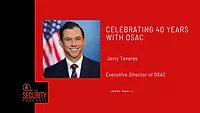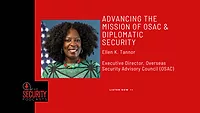Webinar: Celebrating 30 years of the Overseas Security Advisory Council (OSAC)
Gregory Starr, Assistant Secretary for Diplomatic Security at the U.S. Department of State, highlighted OSAC’s activities, including some of its key achievements in supporting U.S. business around the world, as the group celebrates its 30th anniversary this year.
OSAC is a public–private partnership housed in the U.S. Department of State. The office falls under the Bureau of Diplomatic Security, which is responsible for the safety and security of U.S. Embassy and Consulate personnel and facilities. Diplomatic Security agents serving as Regional Security Officers, or RSOs, at these U.S. diplomatic posts abroad are charged with this mission.
OSAC’s mission is to serve as the liaison between the U.S. government and U.S. organizations operating abroad.
“It is our goal to connect U.S. organizations with each other and with the RSOs so that U.S. businesses and organizations are well connected abroad,” said Assistant Secretary Starr. “Our hope is that should a security incident take place, our constituents can rely upon these established networks to receive information and support so that they can better mitigate risks.
Assistant Secretary Starr explained that OSAC’s Regional Analysis Unit provides security analysis through analytical products and security consultations. OSAC’s Outreach and Engagement Unit creates and sustains the security networks through program and event management. Programs include Country Councils, Regional Councils, and Sector-specific Working Groups. And OSAC’s Global Security Unit advises U.S. organizations of direct threats through classified reporting analysis.
“The real value of OSAC may be better understood through a few recent security incidents around the world,” Assistant Secretary Starr said. He gave specific examples of how OSAC was able to leverage its in-depth understanding of geopolitical developments to provide members of the U.S. private sector with real-time information and analysis. For example, after the April 2015 earthquake in Nepal, OSAC constituents reported having personnel in remote places around Kathmandu. OSAC’s South and Central Asia analyst provided an assessment of what was happening on the ground, with the help of information gathered through other constituents operating there. OSAC leveraged Common Interest Councils to get information on road conditions, airport conditions, overland travel concerns, etc. This information was then passed to the various constituents who called. This information also was distributed in an analytical report. Thanks to OSAC’s information-sharing process, constituents were better able to plan evacuations and have a better understanding of the security environment.
During a terrorist attack at an OSAC constituent’s industrial facility in France in June 2015, OSAC contacted the constituent to offer assistance. OSAC provided the company’s U.S.-based security manager with contact information for the Diplomatic Security special agent assigned to the Regional Security Office at the U.S. Embassy in Paris. OSAC also provided the constituent with a “same-day” analytical report that placed the attack into security context. The constituent was able to provide OSAC with very up-to-date information regarding developments on the ground.
Assistant Secretary Starr also touched on another of OSAC’s principal strengths: its ability to create and maintain information-sharing networks… not only at home, but at nearly 150 locations around the world.
For example, OSAC Country Councils, which exist in 149 overseas locations, bring together the U.S. embassy or consulate with OSAC constituents’ regional managers to share information about security issues of mutual concern in the region. These councils encourage managers of U.S. organizations to organize themselves to cope with security-related problems by pooling their resources. Key representatives of these councils and embassy security officers, as well as other post officials, develop working relationships to create an exchange of information through which pertinent security information is shared in a timely fashion. These groups share security information pertaining to their region on a regular basis and meet annually or bi-annually.
OSAC's Common Interest Councils allow representatives from specific sectors such as from academia, aviation, energy, media and entertainment, faith-based organizations, maritime, and the NGO sector to participate in smaller, like-minded groups to ensure more targeted and actionable information sharing.
In addition, the OSAC website is the focal point for the exchange of unclassified information between the U.S. Department of State and the U.S. private sector pertaining to security-related incidents and threats overseas, said Assistant Secretary Starr. Information on the OSAC website includes embassy and consulate warden messages linked through the Department of State’s Bureau of Consular Affairs as well as OSAC Analysis reports with the latest on major security incidents around the world and security-focused reporting searchable by region and/or topic.
More information on OSAC can be found at www.osac.gov
Looking for a reprint of this article?
From high-res PDFs to custom plaques, order your copy today!




